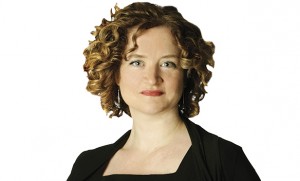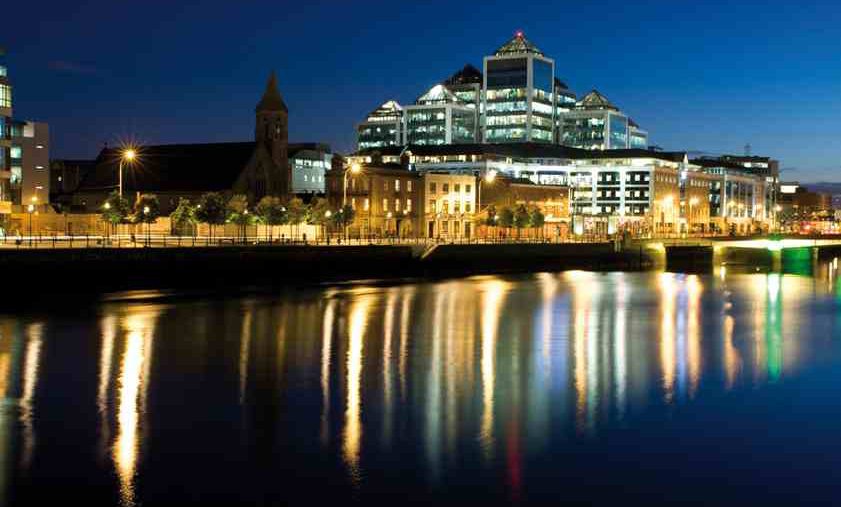'The Brexit vote has been a trigger' - law firms look to Ireland amid concerns over London's future
As DLA and Pinsent Masons eye moves into Dublin, are more law firms set to follow?
February 23, 2017 at 06:32 AM
7 minute read
Earlier this month, international schools firm Nord Anglia Education was given the green light to convert a disused Microsoft office block in the Dublin suburbs into an 800-pupil private school, set to open next year.
The new school is being developed partly to cater for the families of an expected influx of corporate executives and bankers drawn to Dublin by concerns over the post-Brexit prospects for London's status as a financial services centre.
Like private schools and posh restaurants, law firms can always be found in the proximity of banks, and the Irish legal market is currently alive with talk of the next likely entrants.
DLA is open about its intentions to move into the market, with senior partner Juan Picon telling Legal Week last month that the firm's plans are "fairly advanced", while Pinsent Masons appointed an agent to explore property options in Dublin last summer, amid widespread expectations that the firm will open in the Republic this year.
Multiple sources in the market have said that Pinsents held talks with Irish mid-tier firm Beauchamps last year, although the firm has denied that merger talks have taken place. Partners in Dublin also report that recruiters have been active on Pinsents' behalf, looking for potential talent within Ireland. The firm's official line is: "Dublin is an important legal market and it is something we will keep under review."
However, despite the growing interest in the market, some partners at Ireland's top firms are equivocal on the question of an impending influx of international law firms.
 Maura McLaughlin (pictured), a corporate partner at Arthur Cox in Dublin, says: "The standard answer is, 'it depends'. The decisions firms make will be driven by what their clients do."
Maura McLaughlin (pictured), a corporate partner at Arthur Cox in Dublin, says: "The standard answer is, 'it depends'. The decisions firms make will be driven by what their clients do."
The traditional dominance of Ireland's 'big five' firms – A&L Goodbody, Arthur Cox, Mathesons, William Fry and McCann Fitzgerald – combined with Dublin's proximity to London has meant that many international firms have to date been happy to service Irish deals from the UK in conjunction with local firms.
Mathesons corporate partner Eanna Mellett says: "Does it makes sense for firms to move to Dublin? If a whole pile of financial services institutions decide to up sticks and move to Dublin, the answer is 'yes', but I don't think that will happen. Institutions will move the minimum to make sure they can continue to provide their services throughout the EU. Is that enough of an incentive for a UK or international firm to set up an office in Dublin? The answer is still 'maybe'."
However, Barclays has reportedly decided on Dublin as its key EU hub and, according to Bloomberg, plans to move 150 jobs to the city.
 Alan Murphy (pictured), Ireland managing partner of Eversheds Sutherland, says: "It's a chicken-and-egg situation: do you set up in advance of your clients, or do you wait until they have moved? Which may be too late."
Alan Murphy (pictured), Ireland managing partner of Eversheds Sutherland, says: "It's a chicken-and-egg situation: do you set up in advance of your clients, or do you wait until they have moved? Which may be too late."
The looming prospect of the UK's exit from the European single market, signalled last month by Prime Minister Theresa May, has led to a surge of interest from clients who had previously made tentative enquiries about moving operations to Dublin, according to William Fry corporate partner Stephen Keogh.
"We are currently dealing with the second wave of queries from regulated financial institutions interested in establishing themselves in Ireland," he says. "We have noticed a clear shift in position, with clients who were previously at a very preliminary stage in their thinking now moving past the question of whether they are going to seek regulation outside of the UK, to the question of where shall they seek it – and Dublin is definitely one of the options clients are looking at," he says.
Marie Hunt, head of research at commercial real estate firm CBRE's Irish arm, backs up the hardening of interest in recent weeks, saying: "Interest has become more concrete over the last couple of months, and has escalated since Theresa May's speech. In addition to fact-finding exercises, we are also now seeing tours of buildings being conducted and other due diligence being undertaken."
William Nell, a London-based recruiter for Signium, agrees that firms are now examining the Irish market more carefully: "The Brexit vote has been a trigger for making law firms think this is something we should be looking at," he says.
A handful of UK and international firms already have established bases in Ireland. Eversheds entered the Irish market back in 2006, via a merger with Dublin firm O'Donnell Sweeney, while other firms in the market include US firm Dechert, offshore firms Walkers and Maples and Calder, and insurance-focused UK firms DAC Beachcroft, Kennedys, BLM, and DWF.
Dechert established a funds-focused practice in 2010, becoming the first major US law firm to enter the market, with the hire of partner Declan O'Sullivan from Irish firm William Fry.
O'Sullivan says: "A strategic objective for us was to be in each of the main funds centres in Europe: Dublin, London and Luxembourg." The firm is about to add its third partner in Dublin – funds lawyer Jeff Mackey, who is joining from Dillon Eustace.
O'Sullivan says the firm aims to expand further, both through continued organic growth and as a result of Brexit-related work. "We want to be resourced to meet that growth and that is why we are actively hiring and also looking opportunistically for any other opportunities that might arise in other practice areas such as corporate, finance and real estate."
Similarly, insurance firm DWF moved to expand in Dublin prior to the Brexit vote, hiring William Fry corporate partner Ross Little as its executive partner in Ireland in April 2016, with a brief to expand beyond the firm's insurance roots.
The firm, which first opened in Dublin 2008, has subsequently hired partners from Eversheds, Mason Hayes & Curran and William Fry, while Arthur Cox project finance partner Garrett Monaghan is set to join in the next few months. Last month, DWF also merged with Northern Irish firm C&H Jefferson, giving it bases in both Dublin and Belfast.
 Little (pictured) says the decision to expand in Ireland, taken before the Brexit vote, was client driven, but adds: "Brexit reinforces the fact that the strategy DWF had for the Republic of Ireland was timely and well thought out."
Little (pictured) says the decision to expand in Ireland, taken before the Brexit vote, was client driven, but adds: "Brexit reinforces the fact that the strategy DWF had for the Republic of Ireland was timely and well thought out."
UK and international firms in Dublin have been expanding in recent years, and even prior to last year's Brexit vote, many UK law firms were quietly adding their lawyers to the roll of solicitors in Ireland. The latest figures from the Law Society of Ireland show that Freshfields Bruckhas Deringer now has the 11th most lawyers registered on the Irish roll, despite not having an office in the country.
Barry Crushell, a recruiter at Aperture Partners in Dublin, points out: "Big names like Freshfields and Clifford Chance registering competition lawyers in Ireland makes the news, but below the radar, UK firms such as DWF, BLM and Kennedys have already been developing and strengthening their Irish offices."
BLM this week announced that it is doubling its office space in Dublin, signing a lease to take 5,000 sq ft in the city centre, after launching in the city in 2012 and expanding via a merger with local firm Campbell Fitzpatrick in 2014.
But while the UK and international firms in the market seem intent on expanding, there are only a relative handful when compared to most European capitals. As Murphy says: "The real question is: why haven't more law firms come to Dublin?"
This content has been archived. It is available through our partners, LexisNexis® and Bloomberg Law.
To view this content, please continue to their sites.
Not a Lexis Subscriber?
Subscribe Now
Not a Bloomberg Law Subscriber?
Subscribe Now
NOT FOR REPRINT
© 2025 ALM Global, LLC, All Rights Reserved. Request academic re-use from www.copyright.com. All other uses, submit a request to [email protected]. For more information visit Asset & Logo Licensing.
You Might Like
View All
Is KPMG’s Arizona ABS Strategy a Turning Point in U.S. Law? What London’s Experience Reveals
5 minute read
KPMG Moves to Provide Legal Services in the US—Now All Eyes Are on Its Big Four Peers

International Arbitration: Key Developments of 2024 and Emerging Trends for 2025
4 minute read
The Quiet Revolution: Private Equity’s Calculated Push Into Law Firms
5 minute readTrending Stories
- 1SEC Files Lawsuit Against Elon Musk Over Untimely Twitter Ownership Disclosure
- 2Survey Finds Majority of Legal Professionals Still Intimidated by AI Despite Need to Streamline Mounting Caseloads
- 3FTC Launches Inquiry of Single-Family Rental Home 'Mega Investors,' Issues PBM Report
- 4Womble Bond Dickinson's Wilmington Office Sees New Leadership as Merger Is Completed
- 5Defending Against a $290M Claim and Scoring a $116M Win in Del. Drug Patent Fight
Who Got The Work
J. Brugh Lower of Gibbons has entered an appearance for industrial equipment supplier Devco Corporation in a pending trademark infringement lawsuit. The suit, accusing the defendant of selling knock-off Graco products, was filed Dec. 18 in New Jersey District Court by Rivkin Radler on behalf of Graco Inc. and Graco Minnesota. The case, assigned to U.S. District Judge Zahid N. Quraishi, is 3:24-cv-11294, Graco Inc. et al v. Devco Corporation.
Who Got The Work
Rebecca Maller-Stein and Kent A. Yalowitz of Arnold & Porter Kaye Scholer have entered their appearances for Hanaco Venture Capital and its executives, Lior Prosor and David Frankel, in a pending securities lawsuit. The action, filed on Dec. 24 in New York Southern District Court by Zell, Aron & Co. on behalf of Goldeneye Advisors, accuses the defendants of negligently and fraudulently managing the plaintiff's $1 million investment. The case, assigned to U.S. District Judge Vernon S. Broderick, is 1:24-cv-09918, Goldeneye Advisors, LLC v. Hanaco Venture Capital, Ltd. et al.
Who Got The Work
Attorneys from A&O Shearman has stepped in as defense counsel for Toronto-Dominion Bank and other defendants in a pending securities class action. The suit, filed Dec. 11 in New York Southern District Court by Bleichmar Fonti & Auld, accuses the defendants of concealing the bank's 'pervasive' deficiencies in regards to its compliance with the Bank Secrecy Act and the quality of its anti-money laundering controls. The case, assigned to U.S. District Judge Arun Subramanian, is 1:24-cv-09445, Gonzalez v. The Toronto-Dominion Bank et al.
Who Got The Work
Crown Castle International, a Pennsylvania company providing shared communications infrastructure, has turned to Luke D. Wolf of Gordon Rees Scully Mansukhani to fend off a pending breach-of-contract lawsuit. The court action, filed Nov. 25 in Michigan Eastern District Court by Hooper Hathaway PC on behalf of The Town Residences LLC, accuses Crown Castle of failing to transfer approximately $30,000 in utility payments from T-Mobile in breach of a roof-top lease and assignment agreement. The case, assigned to U.S. District Judge Susan K. Declercq, is 2:24-cv-13131, The Town Residences LLC v. T-Mobile US, Inc. et al.
Who Got The Work
Wilfred P. Coronato and Daniel M. Schwartz of McCarter & English have stepped in as defense counsel to Electrolux Home Products Inc. in a pending product liability lawsuit. The court action, filed Nov. 26 in New York Eastern District Court by Poulos Lopiccolo PC and Nagel Rice LLP on behalf of David Stern, alleges that the defendant's refrigerators’ drawers and shelving repeatedly break and fall apart within months after purchase. The case, assigned to U.S. District Judge Joan M. Azrack, is 2:24-cv-08204, Stern v. Electrolux Home Products, Inc.
Featured Firms
Law Offices of Gary Martin Hays & Associates, P.C.
(470) 294-1674
Law Offices of Mark E. Salomone
(857) 444-6468
Smith & Hassler
(713) 739-1250









